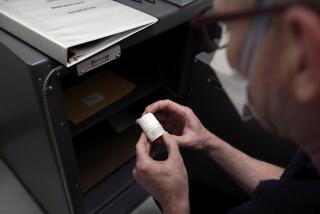Prop. 65 Panel Fails to Expand Listing of Toxics
- Share via
SACRAMENTO — Moving tentatively at its first meeting, Gov. George Deukmejian’s Proposition 65 scientific advisory panel added no new chemicals Tuesday to the governor’s list of 29 substances covered by the anti-toxics ballot initiative.
Although several of the scientists expressed concern about the economic consequences of adding chemicals to the list, the group’s chairman, Wendell Kilgore, a professor at the University of California, Davis, predicted that the panel would expand the governor’s list when it meets again, probably in May.
Whatever the panelists decide to do--even if they choose to take no action--is certain to be controversial, with far-reaching consequences for both public health and the state’s economy. For example, one panel member announced Tuesday that he would urge the group to add alcohol to the list because of strong evidence that heavy drinking by pregnant women causes birth defects.
The governor’s list is the heart of Proposition 65, which requires the governor to list chemicals known to cause cancer or birth defects.
The measure, which won overwhelming voter approval in November, requires that businesses warn consumers and workers of exposure to listed chemicals beginning next March. Businesses would also be barred from dumping significant amounts of listed chemicals in drinking water supplies beginning in November, 1988. Firms that violate the new law will be subject to fines of $2,500 a day per violation.
The deliberate pace of Tuesday’s meeting prompted frustrated environmentalists to speculate that a lawsuit they have filed seeking to expand the list of chemicals would be decided before the 12-member panel begins its detailed deliberations.
In that suit, a group of environmental and labor groups--including the Sierra Club and the AFL-CIO--are trying to force Deukmejian to add to the list more than 200 chemicals shown to be harmful to animals. A hearing in the case has been set for late April.
At their first meeting, the scientists struggled with what standards they ought to be using to decide which chemicals cause cancer or birth defects and therefore must be listed, but they put off that decision until their next meeting.
“What voters wanted is to not have junk in their drinking water,” said Stanford University professor Alice S. Whittemore, vice chair of the panel. Whittemore said, however, that she is troubled by the economic consequences of adding a chemical to the list.
“Whether we like it or not, it is the law,” Kilgore said later.
“I thought they might have achieved liftoff before now,” said Environmental Defense Fund attorney David Roe, one of the authors of the initiative.
Roe and other Proposition 65 proponents contended that the governor should have added more than 200 cancer-causing chemicals identified by two prestigious scientific groups that are referred to, indirectly, in the initiative: the National Toxicology Program and the International Agency for Research on Cancer.
Size of Doses Important
Several of the scientists indicated that they are unhappy simply listing chemicals that at high doses cause cancer to animals but may be harmless to humans at the very low doses that the population is exposed to.
“In a world full of carcinogens, we are eating carcinogens all the time,” said Bruce N. Ames, chairman of the biochemistry department at the University of California, Berkeley. Ames, who signed the ballot arguments against the initiative, contended that half of all chemicals tested in animals have proven to be cancer-causing and that the most important issue is whether low doses represent a real threat to human health.
More to Read
Get the L.A. Times Politics newsletter
Deeply reported insights into legislation, politics and policy from Sacramento, Washington and beyond. In your inbox twice per week.
You may occasionally receive promotional content from the Los Angeles Times.










